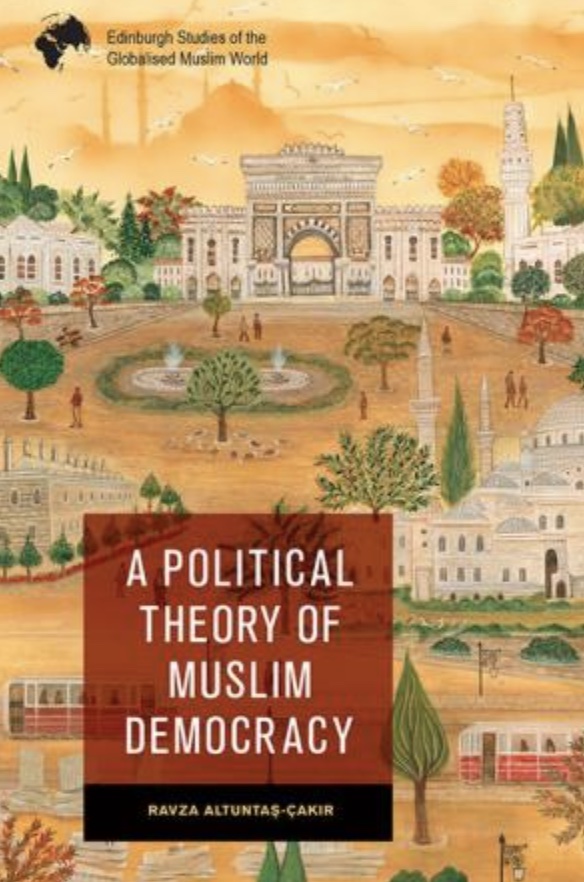
By Islamic Horizons Staff
July/August 2022
Nothing Has to Make Sense: Upholding White Supremacy through Anti-Muslim Racism
Sherene H. Razack
2022. Pp. 276. PB: $28.00
University of Minnesota Press, Minneapolis, Minn.
Razack argues that the figure of the Muslim reveals a world divided between the deserving — those of European origin — and the disposable — all others. Emerging from critical race theory and bridging with Islamophobia/critical religious studies, she demonstrates that anti-Muslim racism reveals white supremacy as a global force and how Western nations have consolidated their whiteness post-9/11 via the figure of the Muslim.
This useful source on race and racisms explains why the global North cannot be understood in the absence of an analysis of how anti-Muslim racism functions as the link among Christianity, whiteness and the colonial apparitions in law and racial sciences.
Hostile Homelands: The New Alliance Between India and Israel
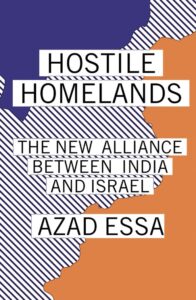
Azad Essa
2022. Pp. 224. $22.95
Pluto Press, London, U.K.
Under Narendra Modi, India has changed drastically. As the world attempts to grapple with its trajectory toward authoritarianism and a “Hindu Rashtra” (Hindu State), more attention needs to be paid to the governments that inspire it and provide military and technical support.
India once called Zionism racism. However, Essa argues, Israel has increasingly become a cornerstone of India’s foreign policy. Looking to replicate the “ethnic state” in both policy and practice, its annexation of Kashmir increasingly resembles Israel’s settler-colonial project in the illegally occupied West Bank.
Essa places India’s relationship with Israel in its historical context, looking at the origins of Zionism and Hindutva, India’s changing position on Palestine and the countries’ growing military-industrial relationship since the 1990s. In addition to offering everything one needs to know about the history of their covert and open ties, the author reveals that the India–Israel alliance has significant consequences for democracy and the rule of law and justice worldwide.
Rethinking Islam in Europe: Contemporary Approaches in Islamic Religious Education and Theology
Zekirija Sejdini
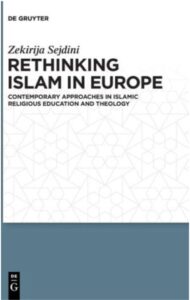
2022. Pp. 180. HB: $80.99
De Gruyter, Berlin, Germany
Islamic theology had to wait for a long time before being granted a place in Europe’s universities. That happened, above all, in the German-speaking areas and led to the development of new theological and religious pedagogical approaches. Sejdini presents and discusses one such approach from various perspectives. He takes up different theological and religious pedagogical themes and reflects on them anew from the perspective of the contemporary context.
His primary focus is on contemporary challenges and possible answers from the perspective of Islamic theology and religious pedagogy. His book discusses general themes like the location of Islamic theology and religious pedagogy at secular European universities. The volume also explores concrete challenges, such as the extent to which Islamic religious pedagogy can be conceptualized anew, how it should deal with its own theological tradition in the contemporary context and how a positive attitude toward its worldview and religious plurality can be cultivated.
At issue here are foundations of a new interpretation of Islam that considers both a reflective approach to the Islamic tradition and the contemporary context. In so doing, it gives Muslims the opportunity to take their own thinking further.
A Political Theory of Muslim Democracy
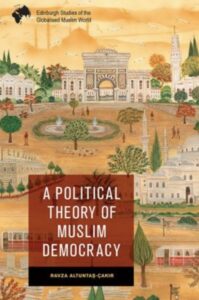
Ravza Altuntaş-Çakır
2022. Pp. 328. HB: $110.00
Edinburgh University Press, Edinburgh, U.K.
Altuntaş-Çakır proposes a framework of Muslim democracy that reconciles public claims made by Muslims with the normative and practical demands of democratic regimes. He examines the ideals, institutions and processes that shape the development of a concrete Muslim-based democratic system — a form of democracy that recognizes religion’s centrality in Muslim societies.
Questioning the customary characterizations of Islam’s compatibility with democracy, he offers a comparative political theory approach that initiates a dialogue between Muslim and Western political thought. He systematically studies debates concerning Muslim political thought, multiculturalism, secularism, the public sphere and constitutionalism, which enables an exploration of Muslim democracy through a political theory approach, rather than a theological one.
Torture, Humiliate, Kill: Inside the Bosnian Serb Camp System

Hikmet Karcic
2022. Pp. 276 (13 photos, 4 charts). HB: $85.00. PB: $39.45
University of Michigan Press, Ann Arbor, Mich.
Half a century after the Holocaust on European soil, Bosnian Serbs orchestrated a system of concentration camps in which they tortured, abused and killed their Bosniak Muslim and Bosnian Croat neighbors. Foreign journalists exposed these horrors during the summer of 1992, sparking worldwide outrage. This exposure, however, didn’t stop the mass atrocities.
Hikmet Karčić shows that the use of camps and detention facilities has been a ubiquitous practice in countless wars and genocides carried out to achieve the perpetrators’ wartime objectives. Although camps have been used for different strategic purposes, their essential functions are always the same: to inflict torture and lasting trauma on the victims.
Under Siege: Islamophobia and the 9/11 Generation

Jasmin Zine
2022. Pp. HB: $130.00 PB: $37.95. Kindle: $36.05
McGill-Queen’s University Press, Montreal
9/11, the subsequent global “war on terror” and the proliferation of domestic security policies in the West profoundly impacted the lives of young Muslims. The Muslim youth who came of age in these turbulent times have had their identities and experiences shaped by these events’ aftermath and backlash.
“Under Siege” explores the lives of the 9/11 generation of Muslim Canadian youth as they navigate these fraught times. As opposed to many other studies, Zine’s ethnographic study focuses on the toll this takes on Muslim communities, especially among younger generations. Based on in-depth interviews with 130+ young people, youth workers and community leaders, she unpacks the dynamics of Islamophobia as a system of oppression and examines how it impacts these youth in terms of, among others, citizenship, identity and belonging, securitization, radicalization, campus culture in an age of empire and subaltern Muslim counter-publics and resistance.
Twenty years after 9/11, Zine reveals how the global “war on terror” and heightened anti-Muslim racism have affected a generation of Muslim Canadians who were socialized into a world where their faith and identity are under siege.
Taking Control: A Muslim Woman’s Guide to Surviving Infertility
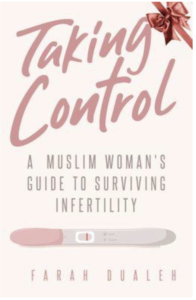
Farah Dualeh
2022. Pp. 152. PB: $16.95
Tugrah Books, Clifton, N.J.
Farah Dualeh, who has tried to conceive for many years, provides guidance for Muslimas who are facing the same issue. She shares her personal experience, along with psychological tools, on how to cope with this traumatic ordeal and offers extensive content from the Islamic perspective, including rulings on certain issues, as well as prayers.
Towards a Sociology of Islam
Muhammad Al-Ghazali
2021. Pp. 245. PB: $28.97
Pharos Media, New Delhi, India
Al-Ghazali examines the empirical method adopted in the modern social sciences that evolved in the historical context of post-medieval European society. The author highlights how it conflicts with the Islamic worldview, which created and sustained a distinct Islamic society on the Madinan model. He argues for adopting a new method based on the primacy of the Islamic criteria for truth and reality.
What did you think about this article? Send comments and story pitches to horizons@isna.net. Islamic Horizons does not publish unsolicited material.